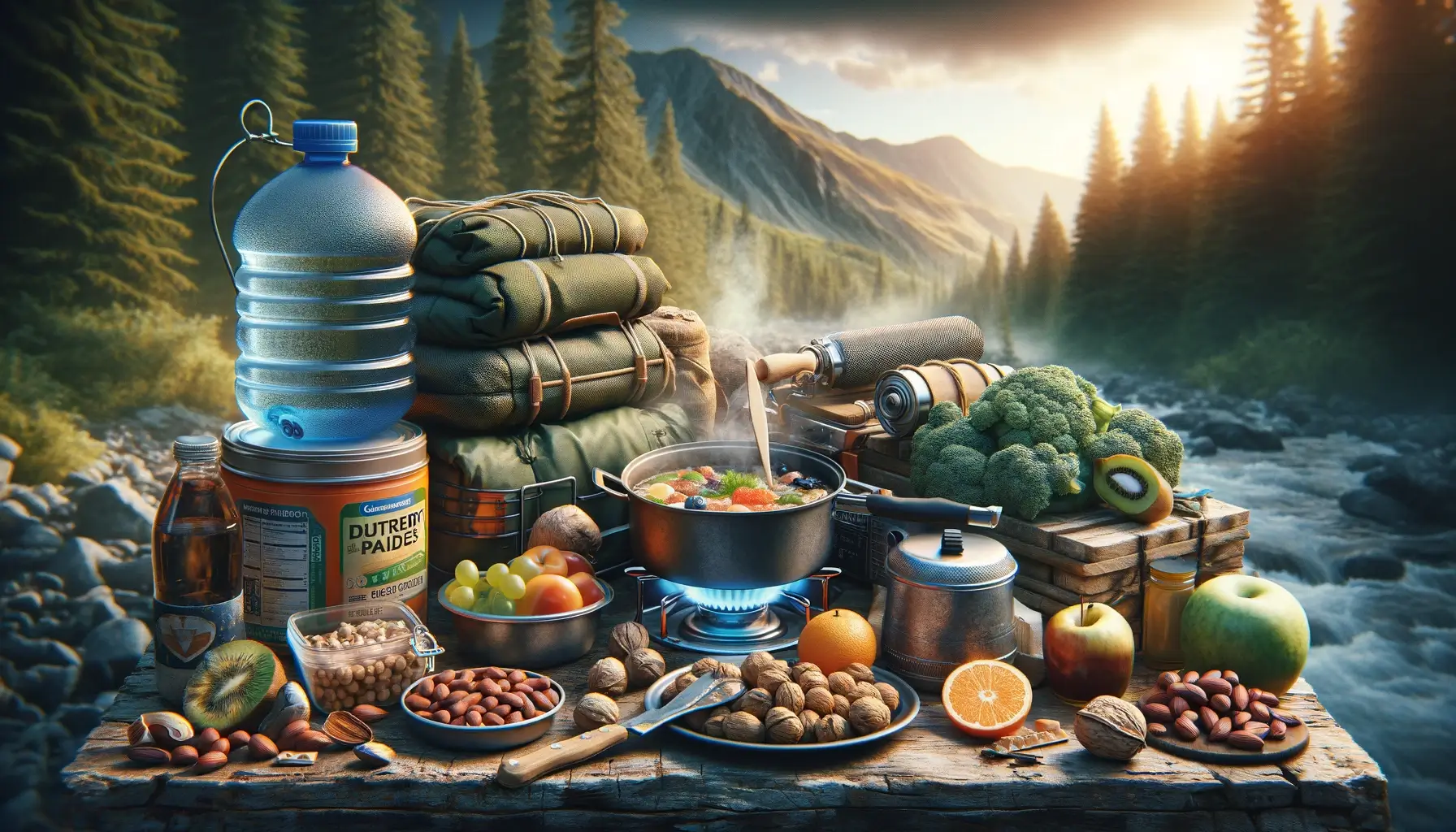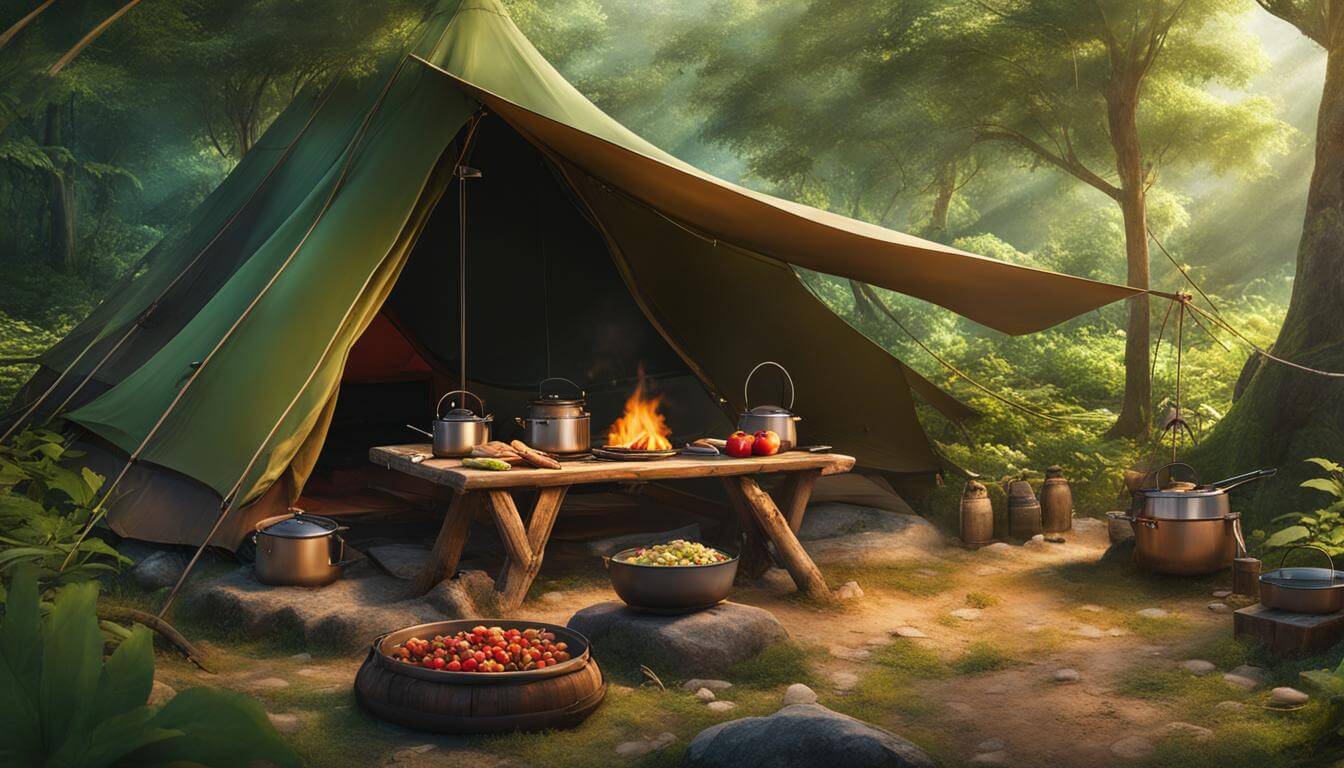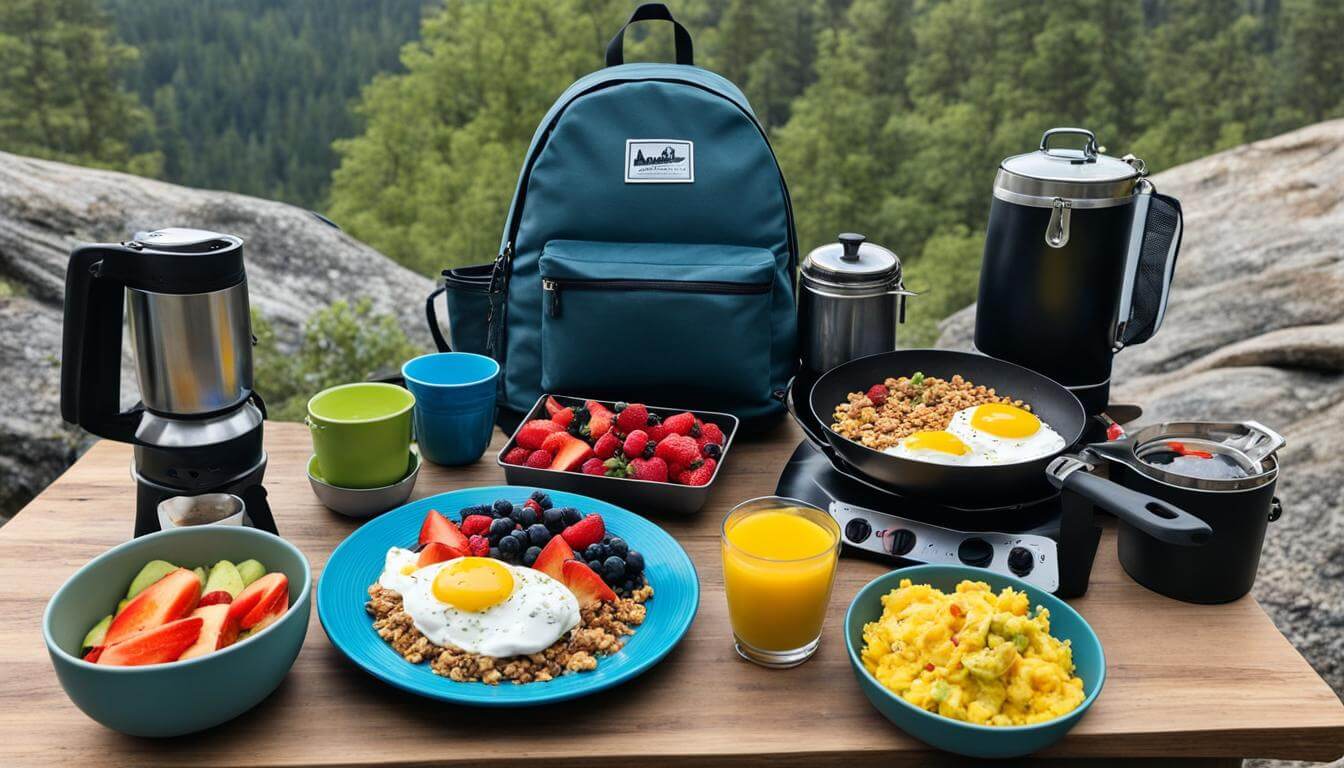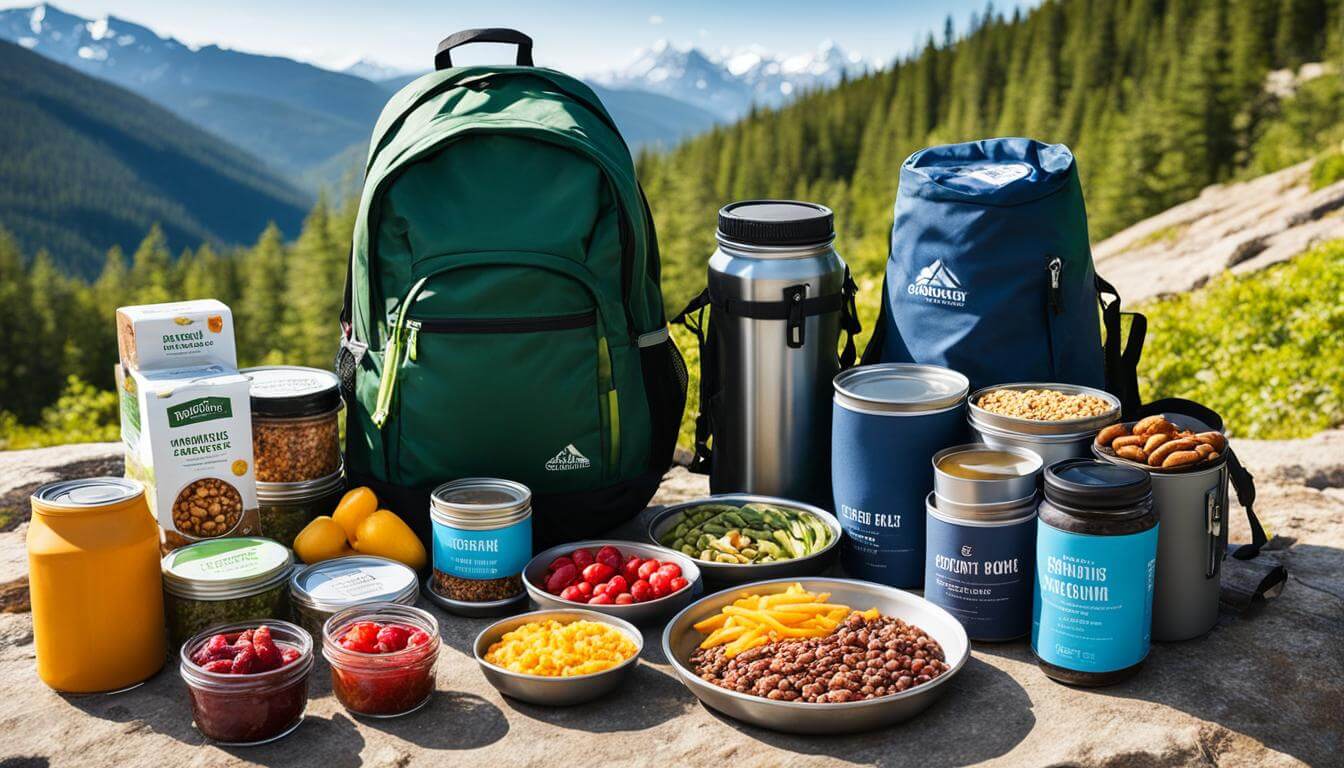Nutrition in the Wild: Eating Healthily Whilst Camping

Regarding camping, there's nothing like immersing yourself in the great outdoors. But what about maintaining a healthy diet while enjoying nature's beauty? The good news is that it's not only possible to eat healthily whilst camping, but it's also highly beneficial. Eating nutritious meals in the wild provides the energy and stamina needed for outdoor adventures, aids in recovery, improves mood and mental clarity, supports the immune system, and shows respect for the environment.
In this comprehensive guide, I'll share valuable insights about the importance of campsite nutrition and provide practical tips for planning and packing nutritious meals while camping. Whether an experienced camper or a novice, it's time to discover how to fuel your body and optimise your camping experience.

Key Takeaways:
- Nutrition in the wild is essential for energy, recovery, mood, and immune support.
- Planning and packing nutritious meals contribute to a successful camping experience.
- Smart packing, proper hydration, and food safety practices are crucial.
- Healthy breakfast and dinner ideas can be enjoyed while camping.
- Responsible camping and outdoor safety should always be prioritised.
The Importance of Campsite Nutrition
Campsite nutrition plays a vital role in optimizing your camping experience. When you prioritise healthy eating while camping, you nourish your body and reap numerous benefits that enhance your overall well-being. A well-rounded, nutrient-rich diet provides you with the energy and stamina needed for outdoor activities, promotes faster muscle recovery, and improves your mood and mental clarity, fully immersing yourself in the wonders of the great outdoors. Additionally, proper nutrition supports your immune system, helping you stay healthy and resilient while exploring nature's playground.
Furthermore, embracing a responsible approach to camping nutrition is essential for your well-being and preserving the natural environment. By making conscious choices about the food you consume while camping, such as incorporating sustainable and locally sourced ingredients, you demonstrate respect for nature and contribute to environmental conservation. Prioritising campsite nutrition allows you to enjoy the benefits of healthy eating while protecting and preserving the beautiful landscapes that surround you.
The Benefits of Campsite Nutrition
Here's a closer look at some of the key benefits you can experience by focusing on campsite nutrition:
- Enhanced Energy and Stamina: Consuming nutrient-rich meals provides you with the fuel you need to tackle outdoor activities, from hiking to kayaking and everything in between.
- Improved Muscle Recovery: A balanced diet with adequate protein supports muscle repair, ensuring you bounce back quickly after physically demanding adventures.
- Enhanced Mood and Mental Clarity: Proper nutrition supplies the brain with the nutrients it needs, improving cognitive function and boosting your mood and mental well-being.
- Stronger Immune System: Eating a variety of nutrient-dense foods helps bolster your immune system, keeping you healthy and resilient in the face of potential challenges.
- Promoting Environmental Responsibility: By making conscious choices about the food you bring and consume while camping, you contribute to sustainable and responsible practices that protect the natural environment.
By prioritising campsite nutrition, you enjoy the physical and mental benefits and develop a deeper connection with nature, appreciating its profound impact on your well-being. So, when packing for your next camping trip, include nutritious meals and snacks that will fuel your adventures and nourish your body.
| Benefits of Campsite Nutrition | Description |
|---|---|
| Enhanced Energy and Stamina | Provides the necessary fuel for outdoor activities like hiking and kayaking |
| Improved Muscle Recovery | Aids in faster muscle repair after physically demanding adventures |
| Enhanced Mood and Mental Clarity | Improves cognitive function and boosts overall mood and mental well-being |
| Stronger Immune System | Bolsters the immune system to stay healthy and resilient during camping trips |
| Promoting Environmental Responsibility | Contributes to sustainable practices and preserves the natural environment |
Camping Nutrition Tips
Planning ahead is crucial for successful camping nutrition. Several key factors regarding healthy camping meal planning must be considered . Firstly, it's important to meal plan before your camping trip. This involves deciding on the types of meals you'll prepare, the ingredients you'll need, and any special dietary requirements.
Researching local foods is another important aspect of responsible camping nutrition. You can enhance your camping meals with fresh and unique ingredients by familiarising yourself with local produce and specialities. Additionally, considering the weather and terrain will help inform your food choices. For example, if you're camping in hot weather, it's crucial to pack foods that won't spoil easily.
When it comes to packing your camping supplies, smart packing is the key to success. Opt for lightweight, non-perishable foods that are easy to carry and have a long shelf life. This ensures that you have nutritious options regardless of the duration of your camping trip. Reusable containers are also essential for storing and transporting your meals, reducing waste and promoting sustainable camping practices.
To ensure a well-balanced camping diet, it's important to include a variety of nutrients in your meals. A balanced meal consists of carbohydrates for energy, protein for muscle repair and growth, healthy fats for sustained energy, and fruits and vegetables for essential vitamins and minerals. By incorporating these elements, you can fuel your body for all the camping adventures.
Furthermore, staying hydrated is crucial for optimal camping performance. Drink plenty of water and consider packing a water filtration system to ensure a safe drinking water supply. Managing portion control is vital to avoid wasting food and overeating. Be mindful of your serving sizes and use reusable food storage bags or containers to pack individual portions.
By following these camping nutrition tips, you can enjoy healthy and satisfying meals while experiencing the great outdoors responsibly.
| Key Tips for Camping Nutrition: |
|---|
| 1. Meal plan before your camping trip |
| 2. Research local foods and specialities |
| 3. Consider weather and terrain when selecting ingredients |
| 4. Pack lightweight, non-perishable foods |
| 5. Use reusable containers for meal storage |
| 6. Include a balance of carbohydrates, protein, healthy fats, fruits, and vegetables in your meals |
| 7. Stay hydrated by drinking plenty of water |
| 8. Practice portion control to avoid food waste and overeating |
Breakfast Ideas
Starting your day with a nutritious breakfast is essential when camping. It provides the energy you need for outdoor activities and sets the tone for a day full of adventure. Here are some healthy and delicious breakfast ideas that are perfect for camping:
1. Overnight Oats
One of the easiest and most versatile options for a healthy camping breakfast is overnight oats. Mix rolled oats with your milk (dairy or non-dairy), add toppings like nuts, seeds, dried fruits, and a sweetener like honey or maple syrup, and let it sit overnight. In the morning, you'll have a creamy and delicious bowl of oats ready to be enjoyed. The best part is that you can customise it with your favourite flavours and ingredients.
2. Scrambled Eggs with Vegetables
If you can access a portable camp stove or grill, scrambled eggs with vegetables make for a protein-packed breakfast that keeps you fueled all morning. Chop up your favourite vegetables like bell peppers, onions, and spinach, and cook them in a pan until they are slightly softened. Beat some eggs, season with salt and pepper, and pour them into the pan with the vegetables. Stir the mixture until the eggs are fully cooked. Serve with whole-grain toast or tortillas for a complete and satisfying meal.
3. Breakfast Burritos

Another delicious option that can be prepared at the campsite is breakfast burritos. Start by cooking scrambled eggs with your choice of vegetables, such as diced tomatoes, mushrooms, and zucchini. Warm up some tortillas on a pan or grill, then fill them with the scrambled eggs, grated cheese, and any additional toppings you like, such as avocado slices or salsa. Roll them up tightly, and you're ready to enjoy a hearty, portable breakfast that energises you throughout the day.
These breakfast ideas provide a well-rounded balance of carbohydrates, protein, and healthy fats, giving you the nutrients you need to start your day right. Whether you prefer a quick and no-cook option like overnight oats or a warm and savoury meal like scrambled eggs with vegetables, these breakfast ideas will fuel your outdoor adventures and ensure a healthy and satisfying camping experience.
Dinner Ideas
Regarding camping dinners, there are various options to consider. Whether you're looking for a quick and flavorful meal or a hearty protein-rich choice, there's something for everyone. Here are some nutritious dinner options for camping:
Dehydrated Meals
Dehydrated meals are a great choice if you're looking for a convenient and tasty option. Brands like Backpacker's Pantry and Peak Refuel offer a wide range of options, including Pad Thai and Sweet Pork and Rice. These meals are easy to prepare and provide nutrients for a healthy camping dinner.
Camp Stove Recipes
If you can access a camp stove, you can get creative with your camping dinners. Consider making a quinoa and black bean salad, which is hearty and protein-rich. This delicious combination will keep you satisfied and energised for your outdoor adventures.
Dutch Oven Delights
Dutch oven recipes are a fantastic option for cooking on a stove or fire pit. From campfire chilli to beef and vegetable stew, these recipes are packed with flavour and can be cooked perfectly in a Dutch oven. Enjoy these dishes' aromatic smells and warm, comforting taste after a long day of exploring.
These dinner ideas ensure that camping meals are healthy and satisfying. Whether you choose dehydrated meals, camp stove recipes, or Dutch oven delights, you can enjoy a nutritious and delicious dinner while camping.
| Meal Option | Description |
|---|---|
| Dehydrated Meals | Quick and flavorful options like Backpacker's Pantry Pad Thai and Peak Refuel Sweet Pork and Rice. |
| Camp Stove Recipes | Try a protein-rich quinoa and black bean salad. |
| Dutch Oven Delights | Cook up delicious campfire chilli or beef and vegetable stew. |
Packing Tips for Camping Nutrition
Regarding camping nutrition, proper packing is essential for a successful trip. Not only do you need to choose nutritious foods, but you also need to prioritise food safety to ensure your meals are healthy and enjoyable. Here are some smart packing tips and food safety practices to consider:
Choose Lightweight, Non-Perishable Foods
Opt for lightweight food options that won't spoil easily during your camping adventure. Non-perishable foods such as dried fruits, nuts, whole grain crackers, and canned beans are excellent choices. These foods provide essential nutrients and can easily be stored and transported without refrigeration.
Invest in Reusable Containers
Reusable containers are eco-friendly and convenient for camping nutrition. They help keep your food fresh, organised, and protected from potential contamination. Look for containers that are durable, leak-proof, and easy to clean.
Bring Portable Cooking Equipment
Potable cooking equipment is essential for preparing nutritious camping meals. A lightweight camping stove, cooking utensils, and a camping kettle for boiling water are must-haves. These items allow you to cook a variety of meals and beverages, giving you more flexibility and options for camping nutrition.
Ensure Proper Insulation for Perishable Items
If you plan to bring perishable items like fresh meat or dairy products, it's crucial to keep them properly insulated to maintain their freshness and prevent foodborne illnesses. Use a cooler or cooler bag with ice packs or frozen water bottles to keep perishable items at a safe temperature. Store the cooler in a shaded area to minimise heat exposure.
| Packing Tips for Camping Nutrition | Food Safety Practices |
|---|---|
| Choose lightweight, non-perishable foods | Wash hands before handling food |
| Invest in reusable containers | Keep raw meats separate from ready-to-eat foods |
| Bring portable cooking equipment | Cook foods to proper temperatures |
| Ensure proper insulation for perishable items | Refrigerate perishable items promptly |
Follow Food Safety Practices
Practicing proper food safety is crucial for preventing foodborne illnesses during your camping trip. Always wash your hands with soap and water before and after handling food. Keep raw meats separate from ready-to-eat foods to avoid cross-contamination. A food thermometer ensures meats are cooked to the proper internal temperature. Refrigerate perishable items promptly to prevent bacterial growth.

Following these packing tips and food safety practices can ensure a successful camping nutrition experience. Remember, the key is to prioritise lightweight, non-perishable foods, invest in reusable containers, bring portable cooking equipment, and maintain proper food safety throughout your trip. With a well-prepared and safe camping nutrition strategy, you can enjoy delicious and nourishing meals that fuel your outdoor adventures.
Hydration and Snacks
Staying hydrated is essential during camping trips. Pre-hydrating before a hike and planning for 2 cups of fluid per hour of hiking help ensure proper hydration. Packing water bottles and considering water purification methods are important for accessing clean drinking water. Healthy camping snacks provide sustained energy and nourishment throughout the day.
Staying Hydrated While Camping
To stay hydrated while camping, it's crucial to pre-hydrate before heading out on a hike. Drink plenty of water in the hours leading up to your outdoor adventure to ensure your body is adequately hydrated. Aim to consume 2 cups of fluid per hour of hiking on the trail to replenish lost fluids through sweat and activity. This will help prevent dehydration and keep you energised throughout your camping trip.
Packing Water Bottles and Considering Water Purification Methods
When it comes to staying hydrated while camping, packing water bottles and considering water purification methods are essential. Bring enough water bottles to suit your needs and the duration of your camping trip. Additionally, it's important to have a reliable water purification system to ensure access to clean drinking water. Options include portable water filters and water treatment tablets, which can effectively eliminate harmful bacteria and viruses from natural water sources.
Healthy Camping Snacks
Eating healthy foods throughout the day is vital to maintain energy levels while camping. Here are some nutritious camping snack options:
- Trail mix: A mix of dried fruits, nuts, and seeds provides a satisfying combination of carbohydrates, healthy fats, and protein.
- Nuts and seeds: Almonds, cashews, walnuts, pumpkin seeds, and sunflower seeds are portable, nutrient-dense snacks that offer a good source of healthy fats and protein.
- Fruit: Fresh fruits like apples, oranges, and bananas are easy to pack and provide natural sugars for quick energy.
- Energy bars: Look for bars made with whole grains, nuts, and seeds for a convenient and satiating snack option.
- Protein bars: Protein bars are a great on-the-go snack, providing a good source of protein to support muscle recovery and keep you feeling full.
These healthy camping snacks will keep you fueled and nourished throughout your outdoor adventures. Remember to pack them in easy-to-access containers, such as resealable bags or small containers, for quick and convenient snacking on the go.
Outdoor Safety and Responsible Camping
During a camping trip, outdoor safety should be a top priority. By taking the necessary precautions and practising responsible camping, you can ensure a safe and enjoyable experience in the wilderness. Here are some camping safety tips and responsible camping practices to keep in mind:
Be Prepared for Emergencies
Preparing for emergencies during your camping trip is essential. Pack a first aid kit with necessary supplies such as bandages, antiseptic ointment, and pain relievers. Familiarise yourself with basic first aid practices so you're ready to handle minor injuries. Additionally, make sure to have a map, compass, and any necessary navigational tools in case you get lost.
Respect Wildlife and Nature
"Look deep into nature, and then you will understand everything better." - Albert Einstein
Respecting wildlife and nature is essential for preserving natural resources. Avoid disturbing or approaching wild animals, as this can be dangerous for you and the animals. Admire them from a safe distance and never feed them. Similarly, leave natural objects and artefacts where you find them, as these are important ecosystem components.
Minimize Waste and Leave No Trace
Responsible camping involves minimising your impact on the environment. Practice Leave No Trace principles, which include leaving your campsite exactly as you found it, disposing of waste properly, and avoiding damaging vegetation. Use biodegradable soap for washing dishes, and avoid using single-use items whenever possible. By leaving no trace, you help preserve the natural beauty of the wilderness for future generations.
Follow Campfire Safety Guidelines
One of the joys of camping is sitting around a campfire, but it's essential to do so safely. Before starting a fire, check for any fire restrictions or regulations. Clear a safe area around the fire pit, ensuring it is not near any vegetation. Always have water or sand nearby to extinguish the fire completely when done. Remember, never leave a fire unattended, and always fully extinguish it before leaving your campsite or going to sleep.
Respect Other Campers
Part of responsible camping is respecting other campers and their experience. Keep noise levels to a minimum, especially during quiet hours. Be considerate of others by not encroaching on their campsite and asking for permission before entering someone else's space. By fostering a friendly and respectful camping community, everyone can enjoy their time in the great outdoors.
By following these camping safety tips and responsible camping practices, you can have a memorable and enjoyable camping experience while respecting the environment and ensuring the safety of yourself and others.
Conclusion
Nutrition in the wild is achievable and vital for a successful camping experience. By prioritising campsite nutrition, planning meals and snacks ahead of time, packing smart, staying hydrated, and following food safety practices, campers can enjoy nutritious and delicious meals while exploring the great outdoors.
With the right preparation and consideration for responsible camping practices, eating healthily whilst camping becomes an enjoyable part of the overall adventure. So, pack your camping gear and embark on a culinary journey through the wilderness!
Remember to prioritise nutrition while camping, as it is crucial in providing the energy and nutrients your body needs. Plan your meals and snacks to balance carbohydrates, protein, healthy fats, fruits, and vegetables. Packing lightweight, non-perishable foods and investing in reusable containers will make food storage and transportation easier. Hydration is equally important, so pack enough water and consider water purification methods if necessary.
By following these camping nutrition tips, you can stay nourished and energised while enjoying the beauty of nature. So, get ready to explore, indulge in delicious meals, and have a fantastic camping experience!
FAQ
Is it possible to eat healthily while camping?
Absolutely! Maintaining a healthy diet while camping is not only possible but also beneficial. By prioritising nutrition and making smart food choices, you can enjoy nutritious and delicious meals while exploring the great outdoors.
Why is campsite nutrition important?
Campsite nutrition is crucial for optimising your camping experience. A well-rounded, nutrient-rich diet enhances energy and stamina, aids in muscle recovery, improves mood and mental clarity, supports the immune system, and promotes environmental responsibility.
What are some camping nutrition tips?
To ensure a healthy camping meal plan, planning is essential. This includes meal planning, researching local foods, and considering weather and terrain. Smart packing, focusing on lightweight, non-perishable foods and reusable containers, is also essential. Staying hydrated and practising portion control are also critical elements of camping nutrition.
What are some nutritious breakfast ideas for camping?
Overnight oats are popular as they require no cooking and can be customised with various toppings. Scrambled eggs with vegetables provide a protein-packed option for those with access to a portable camp stove. Breakfast burritos are another hearty choice that can be assembled at the campsite.
What are some healthy dinner ideas for camping?
Dehydrated meals like Backpacker's Pantry Pad Thai and Peak Refuel Sweet Pork and Rice offer quick and flavorful options. Quinoa and black bean salad is a hearty and protein-rich choice for those with access to a camp stove. Dutch oven recipes, such as campfire chilli and beef and vegetable stew, provide delicious options for cooking on a stove or fire pit.
What should I pack for camping nutrition?
When packing for camping nutrition, it's important to pack smart and prioritise food safety. This includes choosing lightweight, non-perishable foods, investing in reusable containers, bringing portable cooking equipment, and ensuring proper insulation for perishable items like fresh meat or dairy. Food safety practices should be followed, such as washing hands, keeping raw meats separate from ready-to-eat foods, cooking foods to proper temperatures, and refrigerating perishable items promptly.
How can I stay hydrated while camping?
Staying hydrated is essential during camping trips. Pre-hydrating before a hike and planning for 2 cups of fluid per hour of hiking help ensure proper hydration. Packing water bottles and considering water purification methods are important for accessing clean drinking water. Healthy camping snacks, such as trail mix, nuts, seeds, fruit, energy bars, and protein bars, provide sustained energy and nourishment throughout the day.
What are some camping safety tips and responsible camping practices?
Outdoor safety is crucial during camping trips. This includes preparing for emergencies, knowing first aid basics, and respecting wildlife and nature. Responsible camping practices, such as minimising waste, leaving no trace, and practising Leave No Trace principles, help preserve the natural environment for future generations.
In conclusion, is nutrition in the wild achievable and meaningful?
Absolutely! By prioritising campsite nutrition, planning meals and snacks ahead of time, packing smart, staying hydrated, and following food safety practices, campers can enjoy nutritious and delicious meals while exploring the great outdoors. With the right preparation and consideration for responsible camping practices, eating healthily whilst camping becomes an enjoyable part of the overall adventure.
